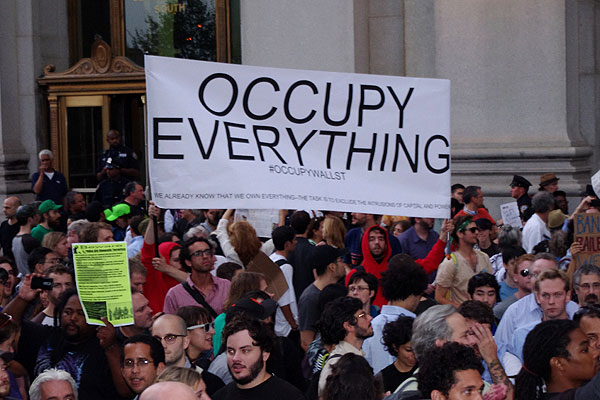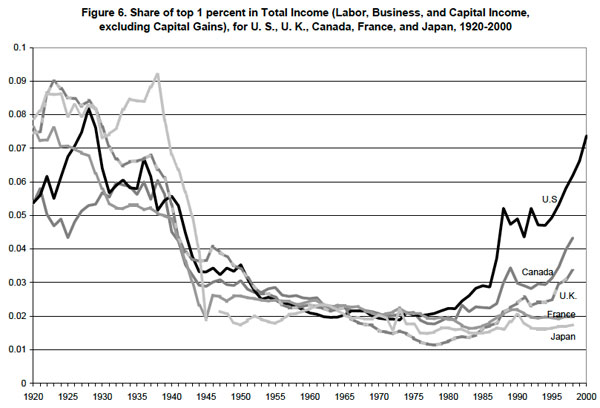
It's been inequality week in my various information feeds:
* John Cassidy, The New Yorker: "Is this how the American class war begins?"
* New York Times: "Top Earners Doubled Share of Nation's Income, Study Finds"
* Talking Points Memo: "Where'd All the Income Growth Go? To the 1 Percent!"
* Mother Jones: "How the Legal System Favors the One Percent"
* Sociological Images: "Wealth Inequality"
&c. So it's been on my mind a lot, and while reading up on it, I came across a fascinating graph:

That's from "Unresolved Issues in the Rise of American Inequality," a handy 2007 survey of the literature on income inequality by Robert J. Gordon of Northwestern and the NBER, and Ian Dew-Becker of Harvard, borrowing on the work of Anthony Atkinson (PDF) and Piketty and Saez (PDF).
Obviously the considerable gain in the one percent's share in recent years is notable, but at least as interesting to me is World War II and the years afterward, when the relatively diverse levels of inequality all collapsed into a narrow band—the "Great Compression"—in the couple decades following the war's end. In another paper, Saez summarizes it, at least for the U.S.:
The overall pattern of the top decile share over the century is U-shaped. The share of the top decile is around 45 percent from the mid-1920s to 1940. It declines substantially to just above 32.5 percent in four years during World War II and stays fairly stable around 33 percent until the 1970s. Such an abrupt decline, concentrated exactly during the war years, cannot easily be reconciled with slow technological changes and suggests instead that the shock of the war played a key and lasting role in shaping income concentration in the United States.
So what happened? A 1992 paper by Claudia Goldin and Robert Margo (available in working form here, PDF) has some ideas. In short: World War II placed a premium on unskilled labor, so the uneducated were in demand and making good wages, which were supplemented by a rising minimum wage and the controls of the National War Labor Board. Meanwhile, the expansion and standardization—including smoothing out regional variations—of education, particularly higher education, produced a glut of white-collar workers, meaning they were less in demand and their wages were lower. For instance:
Measured across all experience groups… there was a 13 percent point decline in the premium to college over high school graduation between 1940 and 1950. The college graduation premium increased during the 1950s, but was still lower overall in 1960 than in 1940.
As for France's Great Compression, in a paper (PDF) for the University of Chicago's Journal of Political Economy, Thomas Piketty attributes similar causes for the decline in income inequality in France—"the main conclusion is that the decline in income inequality that took place during the first half of the century was mostly accidental"—and writes that the country's continued low(er) inequality is "probably because of the dynamic effects of progressive taxation on capital accumulation and pretax income inequality."
Here in the U.S. Gordon and Dew-Becker attribute our increasing income inequality to both public and private causes:
We propose a mix of institutional and market‐driven explanations. Institutional differences between the US and Europe include the earlier and more pervasive introduction of stock options in the US, the tradition of corporatism and cooperative bargaining in Europe that creates constraints on management compensation excess, and the larger role of unions and a higher real minimum wage in some European countries. But the market matters also; gains in profits and price‐earnings ratios in the US stock market in the 1990s spilled over to executive compensation, interacting with the large increase in the share of executive compensation taking the form of stock options.
Canada? I have no idea; as usual, it's like the U.S. but less so. But perhaps it provides a point of compromise for the one and the 99 percent, since it would appear that universal health care and rapidly expanding income inequality are not, at least at this point, mutually exclusive.
Photograph: david_shankbone (CC by 2.0)


